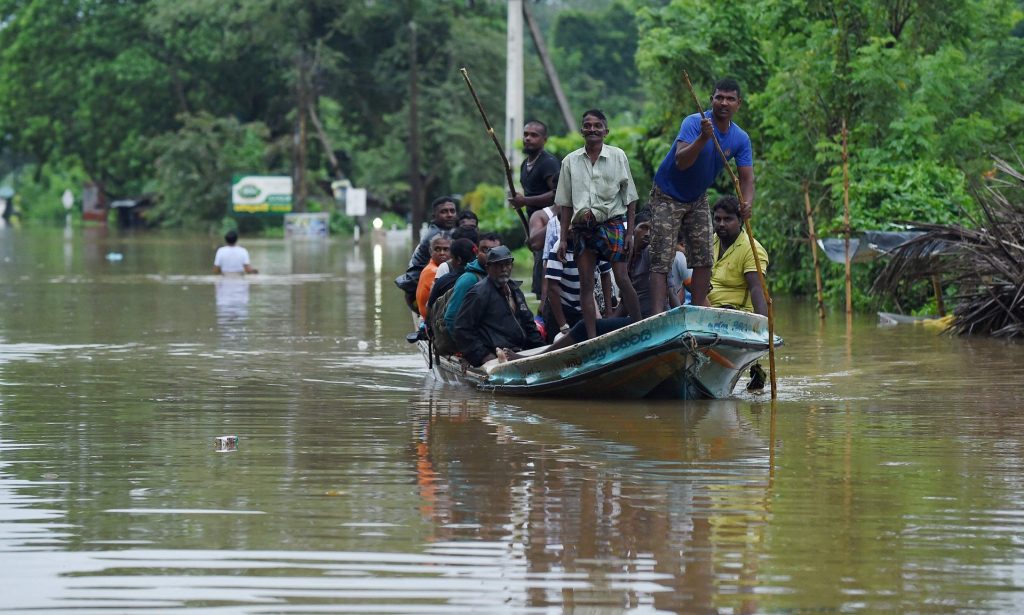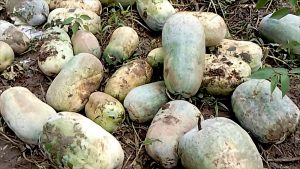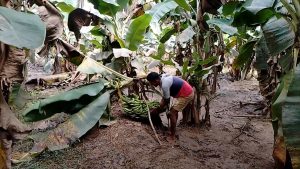People currently enjoying the advantages brought by rain and floods

In the last week, as a cyclonic storm moved across Sri Lanka, health professionals cautioned about the potential rise of waterborne and contagious diseases in areas facing intense rainfall and flooding. The severe destruction to the farming on the island caused by the flooding has led to a sharp increase in vegetable prices. The government claims that it will provide compensation.
The the National Dengue Control Unit (NDCU) Weekly Update showed, 880 dengue cases were reported across 23 districts between November 18 and 24- a 25.5% increase from the previous week.
Director of the National Dengue Control Unit (NDCU) of the Ministry of Health, Dr. Sudath Samaraweera stated that the total dengue cases for November were 3,024, and 45,373 in 2024. “There could be an increase due to the rainfall; however, we have very good control measures in place since the beginning of this year and the start of the monsoon,” he said.
3,024, and 45,373 in 2024. “There could be an increase due to the rainfall; however, we have very good control measures in place since the beginning of this year and the start of the monsoon,” he said.
Senior Consultant Physician Dr. Ananda Wijewickrama said that the rainy season typically experiences an increase in diarrhea, vomiting, leptospirosis, typhoid, and dengue fever. “This isn’t an urgent issue, as rain is causing water to flow; however, when water becomes stagnant, outbreaks will occur,” he mentioned.
Also, the Leptospirosis, commonly known as rat fever, has also surged. Reports indicate over 500 cases in the Gampaha District alone, with more than 5,000 cases islandwide in 2024.
” Adopt preventative measures to reduce the risk of infection, including drinking boiled, cooled water to kill harmful bacteria and prevent the spread of waterborne diseases,” Dr. Wijewickrama urged the public.
He also noted that exposure to muddy water can lead to – leptospirosis. “Doxycycline, a broad-spectrum antibiotic, is prescribed to farmers exposed to waterlogged environments during cultivation season to treat for leptospirosis,” he said. “It is important to increase sanitation and container collection to mitigate the risk of an outbreak through contaminated or stagnant water.”
 In the meantime, Pemasiri Jasingarachchi, the Chairman of the Agricultural and Agrarian Insurance Board, informed the media that heavy rains and flooding over the past few days had caused damage to 390,000 acres of cultivated land. The majority of the damages were noted in the districts of Polonnaruwa, Ampara, and Monaragala.
In the meantime, Pemasiri Jasingarachchi, the Chairman of the Agricultural and Agrarian Insurance Board, informed the media that heavy rains and flooding over the past few days had caused damage to 390,000 acres of cultivated land. The majority of the damages were noted in the districts of Polonnaruwa, Ampara, and Monaragala.
Furthermore, approximately 600 small tanks and dams managed by the Agrarian Development Board have also suffered damage. Over 500,000 individuals experienced the impact of the heavy rains, and there were also 17 reported fatalities.
It was additionally reported that the flood conditions faced in recent days have diminished, but the costs of vegetables and certain fruits have increased.
Certain individuals blamed the new government, while numerous others stated that “we must endure this situation that arose unexpectedly, like a natural disaster.” “We have endured numerous difficult situations as human-made instead of this calamity.”
“By Christmas, elevated prices will decrease.” “Until then, let’s proceed this way,” several remarked.
some farmers from Monaragala, Kalpitiya, and Puttalam told Mojo News that this situation is very pathetic. They said, ” We were about to reap the harvest, but before that, the heavy rain came and destroyed all our hopes …..not only the rain but the flood too took away our harvest.”
“ We were expecting an income of around Rs. One million as the pure income from our harvest. But even two lakhs we will not receive from this destroyed harvest. We have spent initially about 5 lakhs on seeds, oil, and other expenses for this cultivation. But we don’t know how to overcome this.” told Mojo News Somasiri and Josita, a farmer couple from Puttalam who are engaging with vegetables and fruit cultivation.
December 4th, the Agricultural and Agrarian Insurance Board says that compensation for crops damaged due to the recent extreme weather conditions and floods will be provided before the end of the year.
Chairman Premasiri Jasinghe Arachchi states that damage assessments have already started and that 15 teams have been designated for this task.
He mentioned that compensation of up to Rs. 40,000 per acre would be provided to farmers who cultivated paddy, maize, soybeans, potatoes, chili, and big onions.
END.









